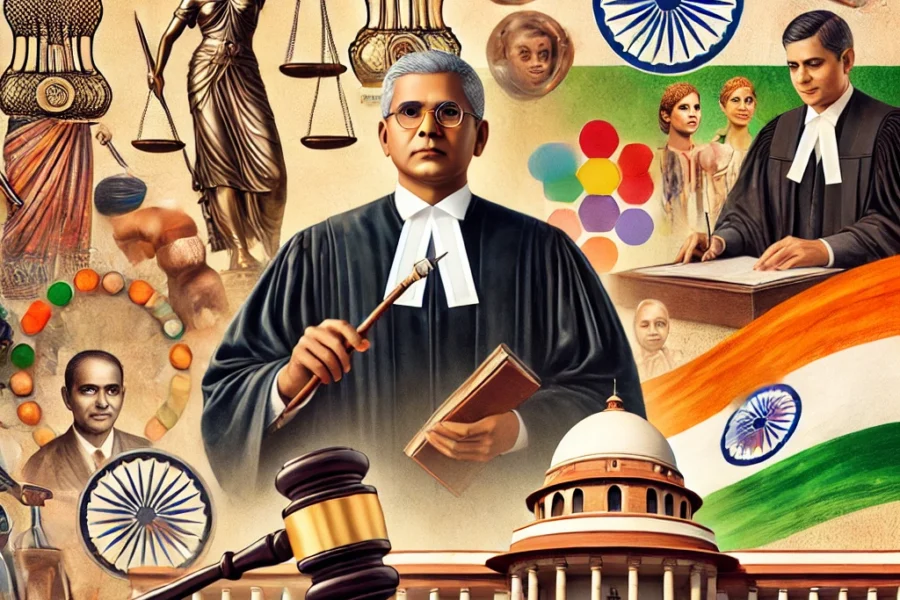India’s constitutional jurisprudence has been profoundly shaped by landmark judgments that have interpreted and redefined the Constitution, reflecting the dynamic and evolving nature of Indian democracy. These judgments not only address the immediate legal issues but also set precedents that influence future interpretations of the law. This article explores some of the most significant judgments in Indian constitutional law, examining their impact on legal principles and societal norms.
Kesavananda Bharati v. State of Kerala (1973)
The Kesavananda Bharati case is a cornerstone in Indian constitutional law, establishing the “Basic Structure Doctrine.” Swami Kesavananda Bharati challenged the Kerala government’s attempts to impose restrictions on the management of his religious property. The Supreme Court, in a 7-6 verdict, held that while Parliament has wide powers to amend the Constitution, it cannot alter its “basic structure.” This doctrine has since been a bulwark against potential abuses of constitutional amendments, ensuring that fundamental principles such as democracy, secularism, and the rule of law remain intact.
Maneka Gandhi v. Union of India (1978)
In the Maneka Gandhi case, the Supreme Court expanded the interpretation of Article 21, which guarantees the right to life and personal liberty. Maneka Gandhi’s passport was impounded without providing her a reason, leading her to challenge the decision. The Court ruled that any law affecting personal liberty must pass the test of reasonableness and fairness. This judgment significantly broadened the scope of Article 21, ensuring that the right to life encompasses not just physical existence but also the quality of life, including the right to live with dignity.
S.R. Bommai v. Union of India (1994)
The S.R. Bommai case dealt with the dismissal of state governments and the imposition of President’s Rule under Article 356. The Supreme Court’s ruling emphasized the importance of federalism and the need for judicial review of such decisions. The judgment stipulated that the President’s decision to impose President’s Rule is subject to judicial scrutiny, ensuring that state governments are not arbitrarily dismissed. This case reinforced the balance of power between the Union and the states, safeguarding the federal structure of the Constitution.
Vishaka v. State of Rajasthan (1997)
The Vishaka case addressed the issue of sexual harassment in the workplace. In the absence of specific legislation, the Supreme Court laid down guidelines to protect women from sexual harassment at work. These guidelines, known as the Vishaka Guidelines, mandated employers to create a safe working environment for women. This landmark judgment not only provided immediate relief but also led to the enactment of the Sexual Harassment of Women at Workplace (Prevention, Prohibition, and Redressal) Act in 2013, highlighting the Court’s proactive role in addressing social issues.
Navtej Singh Johar v. Union of India (2018)
Navtej Singh Johar and others challenged Section 377 of the Indian Penal Code, which criminalized consensual same-sex relations. The Supreme Court, in a historic judgment, decriminalized homosexuality, affirming that it violated the constitutional rights to equality, dignity, and privacy. This ruling marked a significant step towards LGBTQ+ rights in India, acknowledging the importance of individual autonomy and non-discrimination.
Indian Young Lawyers Association v. State of Kerala (2018)
Popularly known as the Sabarimala case, this judgment addressed the entry of women of menstruating age into the Sabarimala temple. The Supreme Court ruled that the temple’s custom of excluding women violated their constitutional rights to equality and religious freedom. This judgment underscored the need to reinterpret religious practices in the light of constitutional principles, promoting gender equality and challenging age-old prejudices.
Justice K.S. Puttaswamy v. Union of India (2017)
In this landmark judgment, the Supreme Court declared the right to privacy as a fundamental right under the Constitution. The case arose from challenges to the Aadhaar biometric system, with petitioners arguing that it violated the right to privacy. The Court’s unanimous decision underscored that privacy is intrinsic to the right to life and personal liberty under Article 21. This judgment has profound implications for various aspects of personal freedom, data protection, and governmental surveillance.
Shayara Bano v. Union of India (2017)
The Shayara Bano case dealt with the practice of triple talaq (instant divorce) in Muslim personal law. The Supreme Court, in a 3-2 verdict, declared triple talaq unconstitutional, stating that it violated the fundamental rights of Muslim women. This judgment led to the enactment of the Muslim Women (Protection of Rights on Marriage) Act, 2019, which criminalized the practice of triple talaq. The case highlights the Court’s role in reforming personal laws to ensure gender justice and equality.
Conclusion
These landmark judgments reflect the Indian judiciary’s pivotal role in interpreting and safeguarding the Constitution. Through these rulings, the Supreme Court has not only addressed specific legal disputes but also reinforced fundamental rights, promoted social justice, and preserved the democratic ethos of the nation. As society evolves, so too does the interpretation of the Constitution, ensuring that it remains a living document that adapts to changing times and needs. These judgments serve as a testament to the enduring strength and flexibility of India’s constitutional framework.
Contributed By: Aakash Jaggia (Intern)
O. P. Jindal Global University, Jindal Global Law School

